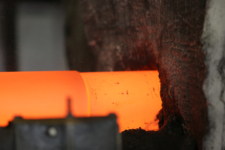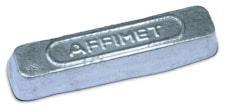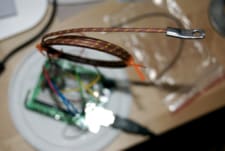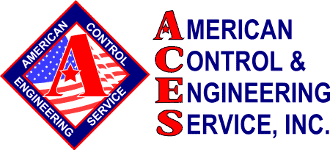THE MYSTERY

A billet heater raises the temperature of a billet to just below flow temperature for extrusion. (Image source: Wikimedia Commons user Romary)
An aluminum extrusion company experienced a fire in one of their billet heaters, which damaged the machine and melted critical components inside the electrical control cabinet, along with a good part of the interconnecting wire. This was a high-demand machine, used to pre-heat aluminum billets and feed them into a press to be extruded into pipes. A backlog quickly developed on the line.
The company was dead in the water, and didn’t have time to go through the typical rebuild process of six weeks, and they were looking for help. One of the companies ACES partners with called us, and we sent a complete team of Control Systems Investigators (CSIs) to the scene — a full-time programmer, full-time electrical designer and full-time field installation supervisor and troubleshooter — a high-efficiency team for the turnkey repair of all damaged systems.

Aluminium ingot
(Image source: Wikimedia Commons user Birdie1121)
THE CLUES
This heater was designed to pre-heat the aluminum billets to about 200ºF below the flow temperature of the metal — near the point where it can be extruded, but not a complete liquid. The remaining heat necessary to mold the parts is created through pressure and friction in the press itself. The heater and press weren’t designed to handle molten aluminum, so when excessive temperatures proceeded to melt the aluminum billets, it caused adjacent materials to catch fire and inflicted great damage on the heater itself.
THE PERP
Upon investigation, the ACES team ascertained that the fire was caused by Zone 1 overheating, without over-temp safeties triggering a shutdown as should have happened.

Thermocouple
(Image source: Flickr user Ferrous Büller)
The design of the heater dictated two thermocouples per zone, placed right next to each other. With this redundancy the system could check that both thermocouples were within a similar tolerance; if not it would determine which thermocouple was within tolerance and use that input.
If both thermocouples failed, the zone should have shut down entirely. Both thermocouples in Zone 1 of the heater did indeed fail at the same time — but the existing programming didn’t shut that zone down, allowing it to overheat and cause the fire.
In the end, a perfect storm of both mechanical and programming issues caused the fire: First, both thermocouples failed at the same time, and second, there was a lack of safety parameters implemented in the programming.
THE SOLUTION
The team rebuilt the heater and replaced the thermocouples, interconnecting wire and control cabinet. The ACES electrical designer redrew the wiring diagram and electrical schematics while the programmer updated the code to ensure proper over-limit safety alarms and shut-downs.
A SECOND MYSTERY
After the team reassembled the billet heater and control cabinet and tested it, the customer said that the machine wasn’t working the way it had before. Upon inspection, ACES ascertained that over years of maintenance on this 20-year-old heater, several different types of burner nozzles had been installed. Not all burner nozzles are the same — Some may burn correctly at low fire but not high fire, or vice versa.
The out-of-spec variation made for a mass of unburned gas in the heater, which would drift around and burn farther down the oven. Instead of getting heat where they were injecting it, the customer was getting heat several feet away.
In addition, incorrect installation of the burners caused secondary air infiltration, unintentionally cooling the burners. In addition, when the ACES team went to do the safety checks that are part of any recommissioning process, they discovered that no ports or taps were installed to facilitate gas line safety checks. They installed the necessary equipment to bring the heater up to code and to allow for standard safety checks in the future.
THE SOLUTION
After replacing, adjusting and tuning burners and burner nozzles, the team finally got the machine running in peak form, with even greater reliability. The heat is consistent and controlled, and all safety alerts are in place. And the project was completed in just three weeks — half the expected turn-around time. Now the customer is back at full capacity, extruding aluminum products, in an efficient and safe environment.
If your heat-treat equipment has overheated, or you just need repairs, tuning, safety checks or commissioning, rest assured that ACES has the experience to have you up and running in short order. Give us a call today for an estimate.
